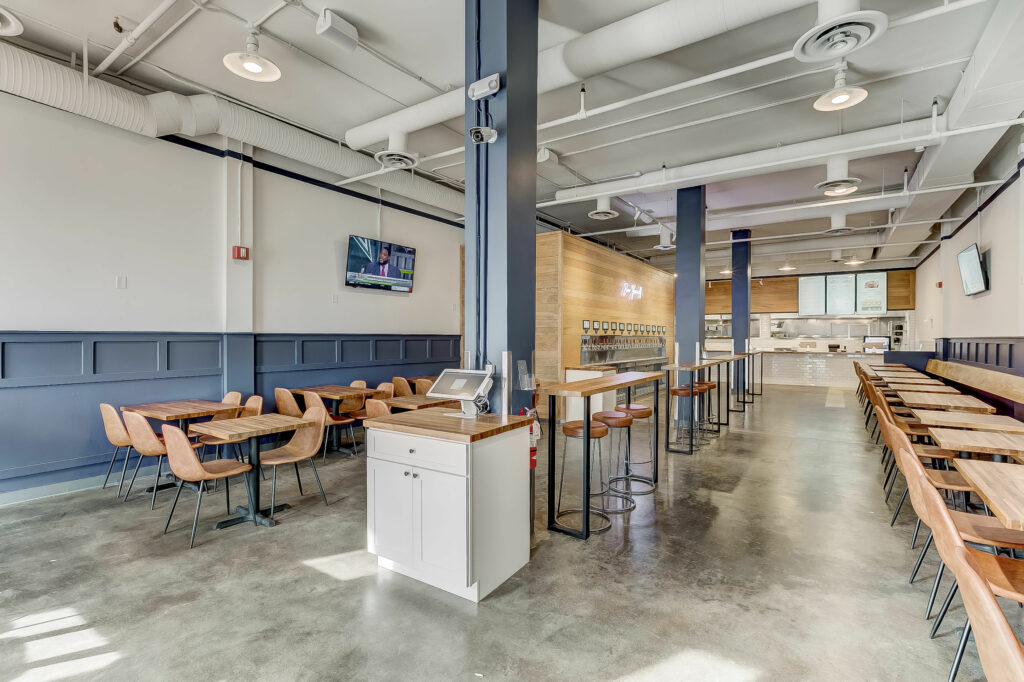Should Your Establishment Have a Kitchen?
If you’re looking to open a business in the hospitality industry but are unsure whether it should have a kitchen or not, you’re in the right place! Many breweries, bars, and taprooms are highly profitable even without a kitchen, but a kitchen can also bring a significant amount of additional revenue.
However, that revenue source comes with requirements to set up and maintain a kitchen, ranging from initial buildout and equipment to staffing and maintenance. It can be a lot to consider!
That’s why we decided to break things down for you. Let’s take a more detailed look into whether or not you should add a kitchen to your bar or taproom, and also cover some basic questions you should answer before you move forward in either direction.
Is It Feasible to Start a Kitchen?
This is a big question, and it’s important to consider it carefully before making any decisions to move forward. A good amount of this will come down to your venue space. Do you have the internal capacity to create a kitchen large enough to accommodate a full menu? You’ll need to make sure, in as quantitative terms as possible, that you can dedicate space for a kitchen. You’ll then need to make sure things like gas lines and water lines can get to this area of your venue to ensure kitchen equipment can function properly.
As you answer these questions, you should also begin to formulate a spatial plan for the way your kitchen would theoretically get set up. Where will your fridge be located, as well as freezers, fryers, sinks, etc.? You’ll need to evaluate your equipment needs and decide on a format for their placement. For example, many kitchens utilize a zone design.
Once you answer some of these higher-level questions and decide that implementing a kitchen is possible, you can start getting into the specifics.
Can I Execute a Great Menu?
Food can ultimately make or break your business when it isn’t done properly. If you do choose to implement a kitchen, partnering up with an executive chef will make all the difference. Trust their expertise. As you begin to work with them, you’ll need to make sure you both deeply understand your target demographic, as well as what their characteristics mean for their culinary tastes.
A good way to get some ideas for where to start is to visit other bars and restaurants around town and see what their offerings are and what types of cuisines are the most popular in your specific area. Once you get a better idea of the optimal menu for your business, you’ll need to do some preliminary planning to make sure you get the correct equipment for the type of food you’re going to cook. If you’re serving burgers and fries, you’ll want to have a grill and fryer, but your needs will change if your food will be of a different cuisine.
What’s The Best Food For My Brand?
This will bring you to the specifics of your menu. What type of food goes well with your overall theme and brand? Do you want to offer simplified bar foods or a more upscale, artisan-style menu?
The answers to these questions should always start with your audience, although you shouldn’t be afraid to add your style. Think about how you want your customers to view your brand and how you can craft menu items to feed into that image.
Maybe you can have some signature burgers or larger plates that encourage sharing, or perhaps a vegan section of the menu to make sure there’s something for everyone. Again, this comes with understanding your market and meeting their needs and expectations (or, even better, exceeding them!).
The choice is yours, and once again, you should coordinate with your executive chef for some expertise and ideas on this front.
If you’re looking to hear from an experienced operator, here is a video from our Fireside Chat with one of our PourMyBeer family members: Jim Wright, the Director of Operations and Industry Consultant at four self-pour locations.
Do I Have the Budget to Start a Kitchen?
Something else to keep in mind is the start-up costs associated with a kitchen. Starting an operation such as a self-pour taproom or brewery without a kitchen will be much cheaper. A full set of kitchen equipment alone can cost tens of thousands of dollars, depending on what you need.
You’ll want to coordinate closely with a contractor to get precise estimates on what costs would look like for the kitchen you need for your establishment and then assess your budget to determine if this is a feasible option.
When you have a fully built-out kitchen, you also must consider and calculate maintenance costs for equipment, which can certainly add up over time. These can be one-off costs each time something needs repair or some companies such as 86Repairs offer subscription plans for 24/7 equipment support.
This will have a big impact on the cost of goods sold. If you want to be profitable, your food costs should stay between 28% and 32%.
Can I Find Awesome Staff?
In addition to all of this, having a great all-around team in the kitchen will be crucial to your success. Your head chef and sous chef are just as important as your executive chef. This will be an entirely new team to add to your establishment, and you’ll want to take the hiring process seriously. How many chefs and servers you hire will depend on what type of kitchen and menu you plan to offer and whether it is a full-service restaurant or one with a smaller menu emphasizing side entrees.
With any additional hires you make, you will need to factor their wages into your budgetary planning process. Your executive chef may advise you on how many staff members they need, and you must make sure you can accommodate this while also being able to pay everyone in the kitchen staff fairly.
What If I Can’t Do a Kitchen?
The short answer: don’t worry. If you don’t feel like handling the logistics and finances of having a full kitchen in your self-pour establishment is a feasible move, partnering with a company such as 2ndKitchen is a great alternative. They offer in-house kiosks where customers can order from nearby restaurants for delivery. There are also third-party apps such as DoorDash, UberEats, and Grubhub, where customers can essentially get food delivered from a multitude of nearby restaurants directly to your self-pour bar, lounge, or taproom!
Another avenue to look into is food trucks. This is a great way to support local businesses and offer your guests delicious gourmet foods. Even a simple taco truck can do the trick. Now your guests have an array of options at their disposal, all while saving you the hassle of managing a kitchen!
The benefit of offering a kitchen and executing it well is the profound effect it will have on your top dollar. Places that choose not to offer food are leaving profits on the table, but again, it’s not for everyone as it certainly requires a larger chunk of time and financial investment. Deciding whether or not it’s the right choice for your establishment is definitely a big one, so make sure you consider all the variables!
Hear From Operators Themselves
If you want to hear takes on this topic from real PourMyBeer operators, we’ve got two great examples:
- John Felico, Owner of Auggie’s Draft Room in St. Augustine, FL. You will hear his take on having a kitchen at 9:19 in his Fireside Chat.
- Roman Maliszweski, Owner of Tapster in Chicago, IL and Seattle, WA. Roman’s take on having a kitchen can be found at 25:48 of his Fireside Chat.
Here When You Need Us!
If you have any questions about adding a kitchen to your establishment, self-pour technology, or any other general inquiries, please don’t hesitate to contact us at cheers@pourmybeer.com or (312) 416-9989.









